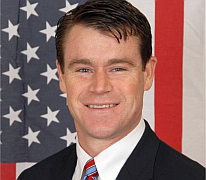 U.S. Senator Todd Young (R-Ind.) sent a letter to Centers for Medicare and Medicaid Services (CMS) Administrator Seema Verma recently calling for CMS to give state Medicaid programs the opportunity to utilize ridesharing services to help Medicaid recipients in underserved areas have greater access to medical care.
U.S. Senator Todd Young (R-Ind.) sent a letter to Centers for Medicare and Medicaid Services (CMS) Administrator Seema Verma recently calling for CMS to give state Medicaid programs the opportunity to utilize ridesharing services to help Medicaid recipients in underserved areas have greater access to medical care.
“Medicaid has continued to provide medical care to millions of Americans for the last 54 years. However, despite its best intentions, this safety net program has not kept up with the many technological innovations in healthcare. Medicaid’s rigid and outdated structure has limited states’ innovative ability to better help individuals and families reach improved health outcomes. The non-emergency medical transportation (NEMT) benefit is one area where the Centers for Medicare and Medicaid Services (CMS) and states can work together to better encourage the use of new technology already being used in the private sector,” Senator Young wrote in the letter.
Identifying innovative ways to improve health outcomes is a goal of Senator Young’s Fair Shot Agenda – an initiative focused on ensuring every Hoosier has a fair shot at success regardless of financial barriers.
The full text of the letter can be found here and below.
The Honorable Seema Verma
Administrator
Centers for Medicare and Medicaid Services
Department of Health and Human Services
200 Independence Avenue, SW, Room 445-G
Washington, DC 20201
Dear Administrator Verma,
Medicaid has continued to provide medical care to millions of Americans for the last 54 years. However, despite its best intentions, this safety net program has not kept up with the many technological innovations in healthcare. Medicaid’s rigid and outdated structure has limited states’ innovative ability to better help individuals and families reach improved health outcomes. The non-emergency medical transportation (NEMT) benefit is one area where the Centers for Medicare and Medicaid Services (CMS) and states can work together to better encourage the use of new technology already being used in the private sector.
Reliable transportation is important for many Medicaid beneficiaries who depend on the NEMT benefit to obtain medical care. In 2012, approximately 1.8 million Medicaid beneficiaries used the NEMT benefit to attend medical appointments, many of these patients being older or disabled. However, according to the Government Accountability Office, patients are not well served by the current system of outdated and limited options. Wait times typically approach an hour and drivers frequently do not show up, which can create opportunities for fraud. This unreliability causes some Medicaid beneficiaries to forgo treatment – defeating the preventative purpose of the NEMT benefit.
Transportation Network Companies (TNC), commonly known as rideshare companies, have the potential to improve the current NEMT benefit. According to the Medicaid and CHIP Payment and Access Commission, TNCs could improve beneficiary experience with shorter wait times and faster service. One example of this already working in the Medicare Advantage program is CareMore Health’s pilot program with rideshare company Lyft in Southern California to assess the impact of Lyft’s NEMT services on patient experience and costs. The resulting outcomes showed the partnership reduced transportation wait times by 45 percent and the average cost per-ride fell 39 percent. Another example is the partnership between Medstar Health and Uber Health that led to 5-10% fewer missed appointments and cost savings that allowed MedStar’s transportation budget to go 40% further. States should have the option of implementing similar models if it makes sense for their programs and populations.
Currently, when it comes to implementing such innovative transportation programs in states, federal Medicaid provider enrollment requirements are not clear in how they apply across provider types. To remedy this confusion, we respectfully request CMS give state Medicaid programs the opportunity to innovate in the space of ridesharing or other new technologies that might increase the efficiency and program integrity of the NEMT benefit. Particularly, we would ask that CMS partner with states to the fullest extent possible to ensure that ridesharing services and other new technologies are a feasible and viable option in the NEMT space.
Thank you for your time and attention to this important matter. I look forward to your response.
Sincerely,














